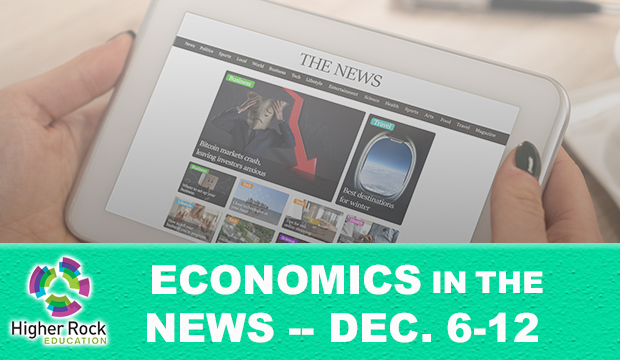Economics in the News – Dec. 6-12, 2021
Economics impacts our lives every day. Below are some of the top storylines from this past week related to economics.
- More than 80 people are feared to be dead after tornadoes blazed through parts of Kentucky and Illinois late Friday and early Saturday. One of the impacted facilities includes an Amazon delivery depot in Edwardsville, Ill., where six people have been confirmed dead.
With its highest employment during the holiday season, Amazon’s fulfillment center across the street from the delivery station was largely left unharmed. Many of the people working in the delivery station were contract drivers. [The New York Times]
- The consumer-price index (CPI) climbed 6.8 percent in November compared to one year ago, according to the Labor Department. That marks the fastest pace of inflation since 1982 and is the sixth consecutive month that inflation has exceeded 5 percent.
The sharp price increases stem from the imbalance between supply and demand in the United States during the recovery from the pandemic. It also largely doesn’t account for the Omicron variant. New vehicles climbed 11.1 percent in November, marking the largest increase on record. Fast-food prices also climbed 7.9 percent. [The Wall Street Journal]
- Prices for a new computer in the United States climbed 8.4 percent from a year ago in the month of October. In Japan, the prices for the same new computers decreased by 1.4 percent in October. Why are the two countries reacting so differently to inflationary pressure?
One of the reasons for the difference is demand. While Japan has seen many of the same supply-chain issues that the United States has, Japan’s consumer demand hasn’t been as strong as in the United States. Another reason for the difference in prices stems from wage increases in the United States from companies to recruit workers. In Japan, workers tend to work for businesses longer-term and companies don’t have the same pressure to offer wage increases. However, gross domestic product (GDP) fell in the 2021 third quarter by an annual rate of (-3.6 percent) while GDP in the United States was 2.1 percent growth. Low prices and prices that never increase can reflect larger economic issues in a country. [The Wall Street Journal]
- In the race for electric vehicles (EV), most of the charging stations that are already in existence or being planned are in majority-White communities. Many minority communities are at risk of being left behind without a charging station nearby.
Activists argue that without the support for minority neighborhoods, it will be difficult to make progress in the fight against climate change. Many residents in urban neighborhoods rely on-street parking and are without garages. President Joe Biden’s infrastructure bill allocates $7.5 billion for new charging stations. He wants to see 500,000 new stations by 2030. One challenge will be getting some of those stations in urban neighborhoods. [The Washington Post]
- What are the greatest economic risks for the global economy heading into 2022? Bloomberg Economics delved into the 10 risks that could impact the global economy heading into the New Year. The COVID-19 pandemic has proven difficult for economists to forecast due to unforeseen changes such as new variants, impacts on inflation and political turmoil.
Among the risks include the uncertainty of the Omicron variant and other potential variants that could cause more lockdowns. Another major risk continues to be inflation and how central banks, such as the Federal Reserve, react to high inflation. Political turmoil between countries in the Middle East could have an impact on the economy as well. [Bloomberg]
